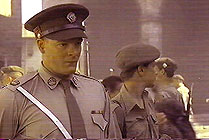|
|
|
|
Tea
with Mussolini
|
 |
|
A coy subtitle at the end of Tea with Mussolini informs us that the boy at the centre of the story, Luca, "grew up to be an artist, and helped in the making of this film". The artist is in fact director and co-writer Franco Zeffirelli, and his personality is stamped all over this approximately autobiographical testament. The film (co-written by John Mortimer of Rumpole fame) offers Zeffirelli the opportunity to revisit a particular slice of his childhood: the Florence of the '30s, when the tides of Mussolini's Fascist state were still barely making ripples upon a genteel tea circle of distinguished and sophisticated ladies, mainly of British extraction. Lady Hester Random (Maggie Smith) is the self-appointed matriarch of this circle – forever intoning solemnities about her dear departed husband, and leading her friends in pompous rituals in honour of the great English poets. Hester is also a rather deluded character: she believes that the act of supping tea with Mussolini has secured her cadre almost royal privileges and approval. Not all of Hester's flowery circle are so naïve. Feisty Mary (Joan Plowright), for instance, has a keen eye for truth, as she goes about "teaching Shakespeare and the difference between right and wrong" to the children in her care. Luca (Charlie Lucas), a dispossessed child, is virtually adopted by the warm-hearted Mary. Through Luca's eyes we see the changes that time wreaks on the Florence set – and also the vibrations stirred by new visitors from other, brasher lands, especially Elsa (Cher). Tea with Mussolini would provide a market researcher with an almost perfect identikit of middlebrow cinema today. It has everything: British manners, beautiful scenery, a sweet little boy, intimations of momentous historical issues just off-screen, and a sweeping musical score by Alessio Vlad and Stefano Arnaldi. With a few extra twists, it could be Life is Beautiful (1997). In particular, it has that remarkable set of leading women: Smith, Plowright, Judi Dench, Lily Tomlin. They have fun with their rather hammy roles, and do what they can with mildly amusing dialogue. Although Zeffirelli indulges the occasional risqué innuendo (particularly where Tomlin's lesbian character is concerned), the film ensures that it will offend no one. Like any film so calculated for middlebrow appeal, it has its odd moments of uncertainty and excess. For instance, there is a strange subtext in the film about the fate of heterosexual masculinity in this all-female enclave-– embodied in the sub-plot of the poor guy who has to dress in drag to escape the Fascist police, at least until the macho blokes of the Resistance pop up to recruit and save him. Tea with Mussolini is as light as air, its charm purely ephemeral. But for those who enjoy their grand British actresses, Florentine villas, glimpses of masterpieces of church and museum art, and bursts of stirring classical music, it will kill a couple of hours painlessly. MORE Zeffirelli: Jane Eyre © Adrian Martin July 1999 |
![]()